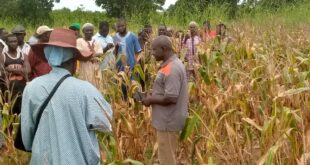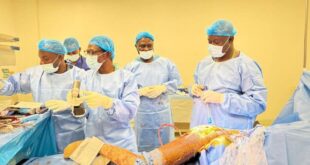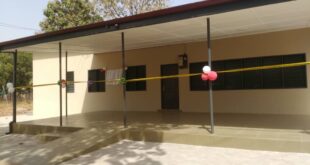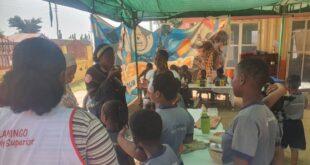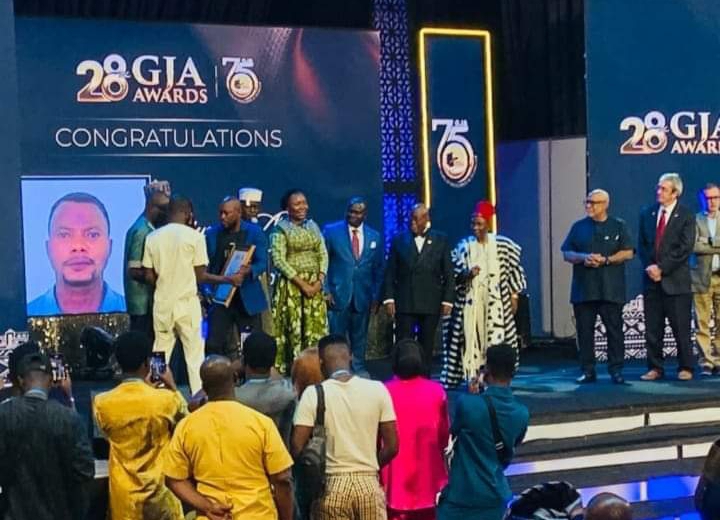 NO PAIN, NO GAIN
NO PAIN, NO GAIN
A journalist has no business being in the good books of the enemies of society.
This conviction led me from the newsroom to the courtroom, sued for defamation multiple times in the line of duty.
The court cases dragged on for years. At times, the dates for the trials clashed in different courts. Such coincidences often left me torn apart.
Until now, the courts in the Upper East region would not tell you the time your case would be called. They would only tell you the day they would sit on it.
Such was how it was when my cases were running. Because I did not know when my case would be called, I would be in court very early, generally by 7:30 a.m. And until it was my turn, I would not go out of the courtroom.
The case may be called in the afternoon hours. I would remain there without anything in my stomach. I developed a serious kind of ulcer later, possibly for going to court on an empty stomach consistently through those years.
There was a midnight the ulcer struck again while asleep. I crawled to the washroom in agony. I was down on the bare floor of the washroom in boxer shorts, dying. While on that floor, I lay my head on the feet of my wife for a pillow. My eyes were partly closed. She stood on the spot, trying to call a doctor friend. After a while, I recovered on my own, rose from the floor, took a bath and walked clumsily back to bed.
I withdrew all the savings I made at ELAC, an insurance company now called Enterprise, to pay a lawyer every legal fee he asked for.
The investigation that led to a minister of state at the presidency, Rockson Bukari, resigning from government was followed by a violent attack on my house. Apparently angry because they did not meet anybody in that house, the faceless assailants, said to be some supporters of the political party in power at the time, stripped the rooms bare and made away with some belongings.
A similar raid happened just two months ago. Before that incident occured, one of my children had told me he dreamt that six people came to the house, took my laptop away and killed everybody. There was a tone of worry in his voice as he narrated the scenes of that dream.
After the narration, I reinforced one of the main doors with a padlock.
On July 18, 2024, the raid, which he dreamt about less than a week earlier, happened. But it fell short of killing. There was an attempt to get to us in the bedroom but the padlock behind the door foiled it.
My laptop was taken away. In the room they broke into were other things thieves generally would like. They did not take anything else away. They probably were not just thieves.
That raid happened a day after I had visited the sites of one of the foreign mining companies in the region, where I openly filmed things the company would not want the public to see and interviewed the indigenous people who were unhappy about those things.
I chose not to talk about this raid in public immediately after it happened. I only reported it to the district police command in Bolgatanga. I also informed the regional police command about it. But I am not impressed with how the police are handling the matter.
Investigative journalists are the most endangered species one can find in the media ecosystem— anywhere on the globe.
While they unhappily endanger their own lives so that society can grow in a free and safe environment, the enemies of society also endanger their lives so that society can break down and rot in the bondage of oppression, injustice and corruption.
My journey in journalism has been rough and tough because I chose a path where you do not do what is cheap and easy but what is right and risky.
The story that won the GJA Journalist of the Year award, Stealing from the Sick, is the riskiest investigative mission I have undertaken so far.
I could have been shot dead on the night the police team began to arrest the suspects.
After investigating how millions of Ghana cedis were being stolen from the hospital in assorted medicines and how the drugs were being moved out of the facility, I was to direct how the police would pick up the members of the syndicate responsible for the massive thefts.
Only the leader of the police team knew I would be waiting in advance in a bush near the building where the stolen medicines were kept before their arrival. When they arrived that night to begin the arrests, I stepped out of the bush to film the action.
The other officers did not anticipate me. On seeing me, they pulled out their guns and held me tight by my belt. I was still recording the action. It was a chaotic scene. Then, their leader told them who I was. If they had fired in my direction, thinking I was part of the syndicate and was out to harm them, the story would have ended there. Their leader and I decided that we would not tell the other members of the team what the mission was about. I feared any of them might leak the secret to the syndicate before the arrests for financial gains.
I remember that while I was going up and down on the court cases initiated against me, an elderly man met me on the high court premises in Bolgatanga. He asked why I was in court. After I gave the answer, he smiled at me deeply and said the court cases would take me to higher grounds.
What he said did not add up, or it did not make sense, if you like. The court cases were taking a crushing toll on my finances, my health, my time, my everything. I told him what I had been through. But he insisted the cases were meant to elevate me, and left.
Actually, as the court cases ran, I observed many injustices in the justice system. One of the observations led me to investigate a high court judge, Jacob Boon, resulting in the resignation of Rockson Bukari.
Another observation triggered the investigation on the Attorney-General’s Office, which led to the dismissal of a senior state attorney, Emmanuel Lawrence Otoo-Boison, after the documentary “Cash for Justice” was aired on GHOne Television.
The violent attack that came after Rockson Bukari’s resignation connected me to Africa’s foremost investigative journalist, Anas Aremeyaw Anas.
I had not met Anas before that time. As the threats mounted, he invited me for a private meeting somewhere in Accra. After the meeting, he gave me a place to stay until the threats subsided.
Anas has been of immense support to me and our bond has grown in a big way ever since. Whenever I feel too threatened, I take shelter for a while at the Whistleblowers and Journalists’ Safety International Centre (WAJSIC), which Anas established in Accra.
The fallout of Rockson Bukari’s resignation, which originated from the lawsuits I suffered, also led me to Emmanuel Dogbevi, one of Africa’s best-known investigative journalists, through whom I got contacts to the Committee to Protect Journalists (CPJ) and some great colleagues at the British Broadcasting Corporation (BBC). The fallout also linked me to some world-class journalists at The Sydney Morning Herald and The Age in Australia.
If I am crowned the Journalist of the Year today in Ghana, I believe it is all part of what the elderly man told me on the court premises long ago: No Cross, No Crown. This painful but gainful experience tells me that God does not prepare a table before us without the presence of our enemies. It tells me enemies must be present first before God can prepare us a table.
It tells me that enemies are part of the requisites we must have to qualify for the next level. It tells me that if a man does not have a useful enemy, he ought to be sincerely worried and he should look for one. It tells me that it is also very important to ask God to increase the salaries and allowances of our enemies so that they do not go on strike. Our progress stalls when and where our enemies go on strike. Please, if you have no enemy yet, look for one.
I am grateful to some great news editors including Kent Mensah, Kwame Acheamong, Ibrahim Alhassan, Isaac Kaledzi, Elvis Adjetey, Awal Mohammed, Peter Ankomah, Eric Ahianyo, and more.
I am grateful to the national Ghana Journalists Association (GJA) executive, led by Albert Kwabena Dumfour, for rebranding the association into a more vibrant and fearless sanctuary that speaks the hard truth to power at all times.
I am also grateful to the Upper East Regional GJA executive, led by a very principled colleague, William Nlanjerbor Jalulah.
To these very special friends and colleagues— Haruna Bugri Sumaila, Gaspard Adongo Ayuureneeya, Joseph Ziem, Osman Issah Abadoo, Francis Dabre Dabang, Castro Senyalah, Titus Alika, Ebo Bruce-Quansah, Godfred Tanam and Isaac Asare— I say thanks a million.
To the dignitaries that graced the awards night in Accra— including the President of the Republic of Ghana, Nana Addo Dankwa Akufo-Addo; the Paramount Chief of Nandom Traditional, Naa Prof. Edmund Nminyem Delle Chiir VIII; the United Nations Resident Coordinator, Ghana, Charles Paul Abani; Ghana’s Minister for Information, Fatimatu Abubakar; and the Vice Chancellor of the Federal University, Kashere, Gombe State, Nigeria, Prof. Umaru A. Pate— I say a big thank-you.
To former President John Dramani Mahama, for constantly condemning the ever-present threats meted out to me and some other journalists under the current government, I say thanks a ton. John Dramani Mahama has never missed a moment to speak for those who speak for others when they are threatened.
A big thank-you to the presidential candidate of the Movement for Change, Alan John Kwadwo Kyerematen, for contacting me on the telephone to congratulate me on the award.
Special thanks also to the Coordinator of Third World Network Africa, Dr. Yao Graham, the General Secretary of the National Democratic Congress (NDC), Fiifi Fiavi Kwetey, former Upper East Regional Director of Health, Dr John Koku Awoonor-Williams, the Dean of the School of Nursing and Midwifery, University for Development Studies, Tamale, Dr. Vida Nyagre Yakong, Prof. Peter Atopare, the Municipal Chief Executive (MCE) of Bolgatanga, Rex Asanga, Adam Bonaa, Johnnie Hughes, Bola Ray, Adib Saani and Godwin Edudzi Tamakloe, Esq.
Big thanks also to the Director of Venceremos Development Consult, Coleman Agyeyomah, Professor in Development Studies and Adult Education and Canada Research Chair of Sustainability and Social Change Leadership at St. Francis Xavier University, Prof. Jonathan Langdon, the Executive Director of Savannah Research and Advocacy Network, Yen Nyeya, Gordon Crawford, research professor at the Coventry University in the United Kingdom, the Member of Parliament (MP) for North Tongu, Samuel Okudzeto Ablakwa, ACP Samuel Tibil Punobyin, COP (Retd) Patrick Akolgo, MP for Builsa South, Dr. Clement Apaak, the members of the Concerned Citizens of Talensi and the Talensi Mining Communities Initiative (TAMCI).
I cannot thank you enough, Eryk Bagshaw and your great colleagues at The Sydney Morning Herald and The Age, Australia.
Big, big thanks to Anas (the Overlord of Undercover) and to Emmanuel Dogbevi.
To my family, to whom I have always apologised for putting their own freedoms at risk in my professional quest to protect the freedoms of society from the crushing claws and jaws of oppressors, I say warmest thanks. And to the families of Zumah Baba Tii-roug, Akobulgo Zotipelga Ayeo and Rufai Karim for supporting my family in times of trials and troubles I say gracias.
It was impossible to answer all the numerous calls I have received since Saturday. My phone was ‘smoking’ from the heat of the overwhelming calls, understandably so because it appears this is the first time a journalist based in northern Ghana has been given the country’s highest award in journalism.
It has been tales of tragedies, trials and triumphs. I dedicate this award to all the patients who died owing to the thefts of medicines at the regional hospital in Bolgatanga and to Mercy Alagpulinsa and Samuel Amoateng Saffoh whose sudden deaths are strongly believed to be linked to the drug thefts at the hospital because they were potential upright witnesses.
Yes, the award is big, and it is for all of you, but the best way we can appreciate it is to step up our commitment to the ongoing struggles against the oppressors and the enemies of society. Let us continue to use the lawful means at our disposal to torment those who torment society by turning the spotlight of accountability on their atrocities.
As for me, this recognition will not change who I am. I will remain ordinary and hope to do more extraordinary stories. I am not the first to receive this recognition in Ghana and certainly I will not be the last to receive it.
I should end by saying journalism is not about awards. It is about a passion to trigger a positive change and to protect that change in the lives of people and communities. In fact, I believe journalists must defend justice and fairness without compromise and at all times even if it means going to jail for the conviction they hold in the public interest.
This is why I strongly believe that the best prize a journalist can ever get is not a glass trophy or a gold medal but a steel handcuff, a handcuff not for committing a crime but for exposing the crimes committed by oppressive and corrupt powers against humanity.
This is why I do the things I do. And this is why I am an Edward, not a coward.
Many thanks.
By Edward Adeti, Ghana’s 2023 Journalist of the Year and Investigative Journalist of the Year
By SavannahNewsOnline.Com/Philip Liebs
 Savannah News Online Reporting Only What Matters Most
Savannah News Online Reporting Only What Matters Most
